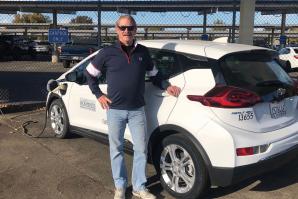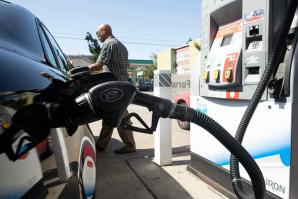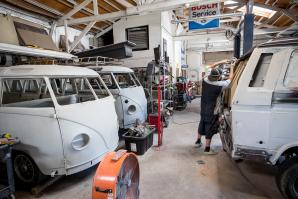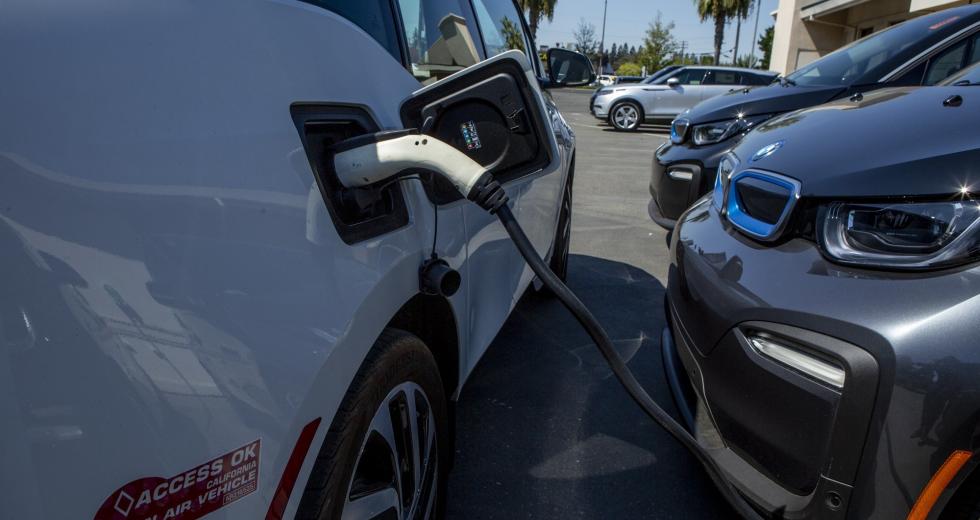Lea este artículo en español.
An audit of California’s climate change program criticizes state officials for overestimating the benefits of its efforts to encourage Californians to drive cleaner vehicles.
The state auditor warned that California may not meet its goal to cut greenhouse gases by 40% by 2030 if it doesn’t pick up the pace. Emissions from transportation have increased since 2013, which the report calls “a problematic trend.”
“Given the ambitious nature of the State’s climate change goals and the short time frame to meet them, California is in need of more reliable tools with which to make funding decisions,” California State Auditor Elaine Howle wrote in a letter to Gov. Gavin Newsom and legislators.
According to the audit, the California Air Resources Board “has generally not determined the effects its incentive programs have on consumers’ behavior and thus, has overstated (greenhouse gas) emissions reductions its incentive programs achieve.”
That data determining how well clean-car rebates and other voucher programs are working is critical for weighing the cost effectiveness of programs that use the state’s cap and trade funds to pay Californians and businesses to buy zero-emission vehicles.
Richard Corey, executive officer of the California Air Resources Board, said the agency is committed to collecting and analyzing the additional information that the auditor recommended.
“In the case of some recommendations, it will take time to work through the public process to determine the most efficient and effective mechanisms,” he wrote.
The air board does not collect enough data to tell whether the majority of its rebate and funding programs led people to buy cleaner vehicles, which makes it tougher to assess their cost-effectiveness.
The Air Resources Board has both regulations and incentive programs to scrub carbon pollution from cars, trucks, buses and freight. Sometimes, these efforts overlap: One program, for instance, tasks vehicle manufacturers with selling a certain proportion of zero emission vehicles in the state. Others offer rebates to Californians who buy these vehicles.
That overlap is where the air board is falling short by failing to measure how much additional reductions come from the rebates and other incentive programs, the audit said.
“By not taking into account the effects that regulations and other factors have on emissions, CARB overstates the incentive programs’ (greenhouse gas) reductions, although it is unclear by how much,” the audit said.
The air board also does not collect enough data to tell whether the majority of its rebate and funding programs led people to buy cleaner vehicles, the audit reported. That makes it tougher to assess their cost-effectiveness.
State rebates for zero-emission and plug-in hybrid cars range from $1,000 to $4,500 per vehicle.
California lawmakers have doled out more than $2 billion of cap and trade income to fund the clean transportation programs since the 2013-2014 fiscal year.
But income from the carbon trading program is variable and is expected to dwindle as the state’s biggest polluters clean up emissions. Last year, for instance, the air board’s clean transportation program took an $81 million hit amid a cap and trade auction shortfall during the first months of the coronavirus pandemic.
“The State needs more accurate program measurement to guide its (greenhouse gas) investments and increase the chances of meeting its (greenhouse gas) goals,” the audit said.
CalMatters.org is a nonprofit, nonpartisan media venture explaining California policies and politics.
–
Stay up to date on the effects of the coronavirus on people and business in the Capital Region: Subscribe to the Comstock’s newsletter today.
Recommended For You

Fleet of the Future
The City of Sacramento moves its municipal vehicles toward sustainability
Sacramento is working to turn its fleet into a model of municipal sustainability with electric vehicles, a software-and-hardware suite to monitor efficiency, and more.

Newsom Orders Ban of New Gas-Powered Cars by 2035
In a dramatic move to tackle climate change, Gov. Gavin Newsom announced that he has ordered the Air Resources Board to ban new models of traditional cars beginning in 15 years.

Leading With Energy
SMUD CEO and General Manager Paul Lau on reaching zero carbon emissions by 2030
Comstock’s spoke to Lau about leading the country’s sixth-largest community-owned electric utility and about his plan to reach zero carbon emissions within 10 years.

Haus of Cars
Kombi Haus is slowly taking over a city block in Sacramento’s Oak Park neighborhood. Owner Justin Campbell opened the Volkswagen repair and restoration shop 20 years ago as a small garage on 34th Street. The business now covers over 12,000-square-feet of space across three buildings in the Triangle District.



